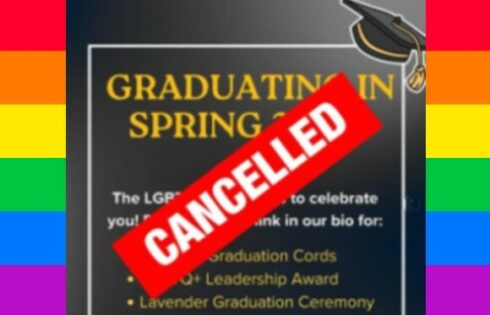
UW-Madison survey finds majority support among students for cracking down on offensive speech
A new survey from the University of Wisconsin-Madison shows that 63 percent of students on campus believe the government should be able to punish “hate speech.”
The question asked was: “How much do you agree or disagree with the following statement: The government should be able to punish hate speech?” An overwhelming majority responded that they agreed, while 29 percent disagreed, and six percent were unsure.
Further, 40 percent of students agreed the government should be able to restrict the speech of “climate change deniers” and 50 percent of students believe the government should be able to restrict the speech of “racially insensitive people.”
The online survey of 530 undergraduate students was conducted between October 20 and November 9 by the Tommy G. Thompson Center Center on Public Leadership, a center-right think tank on campus, in partnership with the University of Wisconsin Survey Center.
“These results show that many students find it difficult to distinguish between, on the one hand, the moral concerns of speech or activities that are contested or even detestable and, on the other, the long run value derived from free speech and religious liberty,” the report reads.
“These results are alarming,” Thompson Center Director Ryan Owens told The College Fix.
“Free speech and religious liberty protect us. History shows that rulers, when they can, will snuff out the speech and beliefs of their opponents,” Owens said.
“For centuries, Americans have believed it is better to allow speech, even speech with which we might vehemently disagree, than to empower the government to tell us what to think, what to say, and how to pray,” he added.
The survey is consistent with other recent polls of students’ attitudes toward free expression.
In March 2020, a survey by College Pulse found that 60 percent of students believe “offensive jokes can constitute hate speech.”
In one 2019 survey by the Foundation for Individual Rights in Education, a majority of college students said they value inclusivity over free speech, think their fellow students should have their political views censored if they are hurtful or offensive to certain students, and think that students should be excluded from extracurricular activities if they publicly express intolerant, hurtful, or offensive viewpoints.
The UW-Madison survey released Thursday found significant differences of opinion between male and female students. Only 47 percent of male students said they “slightly,” “somewhat,” or “strongly” agreed that the government should be able to restrict hate speech, while an astounding 75 percent of female students believed so.
Further, self-identified liberals were more likely to support speech restrictions than self-identified conservatives. While 62 percent of liberals agreed that a person should be able to prevent another person from speaking if they believe that person’s speech is hateful, only 18.1 percent of conservatives supported such speech restrictions.
What constitutes “hate speech” is a hotly contested issue on college campuses, as activist groups often try to expand what the term includes. Things deemed “hate speech” on American college campuses often include public statements on abortion, gender, race and immigration.
“A government strong enough to control speech is powerful enough to control thought,” the report reads.
The survey found that 53 percent of students on campus believe that employers’ religious beliefs “should give way when it comes to providing goods or services, like contraceptives or abortion coverage, that violate their religious beliefs,” and 35 percent believe that public institutions should be allowed to revoke invitations to speakers “who might offend someone.”
Interestingly, when students were asked whether they should be compelled to fund student organizations with which they disagree, 69 percent opposed mandated fees to do so. This suggests that while students seem comfortable with restricting the speech of others, they oppose being told what speech they have to support.
The report argues the results of the survey “are at odds with UW-Madison’s stated dedication to academic freedom and freedom of expression,” and that the school “must do more to instill in its students a deeper respect for and understanding of the First Amendment, its protections, and the importance of an unfettered marketplace of ideas.”
The survey suggests that students would have greater respect for freedom of expression if they were required to take a class on the First Amendment before graduating.
While pointing out that UW-Madison graduates must take three credits of “ethnic studies” before graduating, the report notes a First Amendment course requirement “would ensure that students graduate with requisite skills ‘to participate effectively and respectfully in a multicultural society, including in the workplace.’”
UW-Madison spokeswoman Meredith McGlone said the school believes strongly in the rights to free speech and expression provided in the First Amendment.
“University campuses are fertile ground for the free exchange of ideas, and UW-Madison has a legacy of promoting free and open expression,” McGlone said in an email to The Fix.
“Over the years the university has welcomed a range of speakers from across the political spectrum,” she said. “Each fall, we communicate to all students and registered student organizations about freedom of speech, including clearly outlining expectations for students if they choose to participate in protests or demonstrations. Among those expectations is that one cannot disrupt another person’s right to free speech,” McGlone said.
But the Thompson Center argues free speech education on campus could be better.
“The university could be helpful on this issue by providing greater training to students about what the First Amendment protects, and why,” Owens said.
MORE: UW-Madison moves ahead with removal of boulder accused of being racist
IMAGE: Avemario / Shutterstock
Like The College Fix on Facebook / Follow us on Twitter






Please join the conversation about our stories on Facebook, Twitter, Instagram, Reddit, MeWe, Rumble, Gab, Minds and Gettr.